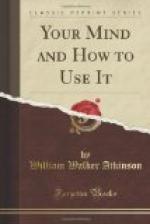A little reflection will show that though there is a distinct difference between processes of acquisition and of construction, nevertheless the two must not be regarded as entirely separate from each other. “In acquiring new facts we must always use a little reason, while in constructive work, we cannot always rely upon having all the necessary matter ready to hand. We have frequently to stop our constructive work for a little in order to acquire some new facts that we find to be necessary. Thus we acquire a certain number of new facts while we are reasoning about things, and while we are engaged in acquiring new matter we must use our reason at least to some small extent.” The two overlap, then. But there is a difference between them from the standpoint of the student, and the terms denote two fundamentally different attitudes which students take in study. The two attitudes may be illustrated by contrasting the two methods often used in studying geometry. Some students memorize the theorem and the steps in the demonstration, reciting them verbatim at class-hour. Others do not memorize, but reason out each step to see its relation to the preceding step, and when they see it must necessarily follow, they pass on to the next and do the same. These two types of students apparently arrive at the same conclusions, but the mental operations leading up to the Q.E.D. of each are vastly different. The one student does his studying by the rote memory method, the other by the road of reasoning. The former road is usually considered the easier, and so we find it most frequently followed. To memorize a table, a definition, or a series of dates is relatively easy. One knows exactly where one is, and can keep track of one’s progress and test one’s success. Some people are attracted by such a task and are perfectly happy to follow this plan of study. The kind of mind that contents itself with such phonographic records, however, must be acknowledged to be a commonplace sort of affair. We recognize its limitations in ordinary life, invariably rating it lower than the mind that can reason to new conclusions and work independently. Accordingly, if we wish to possess minds of superior quality, we see that we must develop the reasoning processes.
When we examine the mental processes by which we think constructively, or, in other words, reason, we find first of all that there is recognition of a problem to be solved. When we start to reason, we do it because we find ourselves in a situation from which we must extricate ourselves. The situation may be physical, as when our automobile stops suddenly on a country road; or it may be mental, as when we are deciding what college to attend. In both cases, we recognize that we are facing a problem which must be solved.




